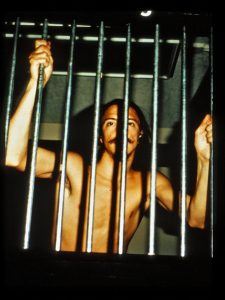Benedict Carey in The New York Times:
 The Stanford prison experiment is a case in point. In the summer of 1971, Philip Zimbardo, a midcareer psychologist, recruited 24 college students through newspaper ads and randomly cast half of them as “prisoners” and half as “guards,” setting them up in a mock prison, compete with cells and uniforms. He had the simulation filmed. After six days, Dr. Zimbardo called the experiment off, reporting that the “guards” began to assume their roles too well. They became abusive, some of them shockingly so. Dr. Zimbardo published dispatches about the experiment in a couple of obscure journals. He provided a more complete report in an article he wrote in The New York Times, describing how cruel instincts could emerge spontaneously in ordinary people as a result of situational pressures and expectations. That article and “Quiet Rage,” a documentary about the experiment, helped make Dr. Zimbardo a star in the field and media favorite, most recently in the wake of the Abu Ghraib prison scandal in the early 2000s.
The Stanford prison experiment is a case in point. In the summer of 1971, Philip Zimbardo, a midcareer psychologist, recruited 24 college students through newspaper ads and randomly cast half of them as “prisoners” and half as “guards,” setting them up in a mock prison, compete with cells and uniforms. He had the simulation filmed. After six days, Dr. Zimbardo called the experiment off, reporting that the “guards” began to assume their roles too well. They became abusive, some of them shockingly so. Dr. Zimbardo published dispatches about the experiment in a couple of obscure journals. He provided a more complete report in an article he wrote in The New York Times, describing how cruel instincts could emerge spontaneously in ordinary people as a result of situational pressures and expectations. That article and “Quiet Rage,” a documentary about the experiment, helped make Dr. Zimbardo a star in the field and media favorite, most recently in the wake of the Abu Ghraib prison scandal in the early 2000s.
Perhaps the central challenge to the study’s claims is that its author coached the “guards” to be hard cases. Is this coaching “not an overt invitation to be abusive in all sorts of psychological ways?” wrote Peter Gray, a psychologist at Boston College who decided to exclude any mention of the simulation from his popular introductory textbook. “And, when the guards did behave in these ways and escalated that behavior, with Zimbardo watching and apparently (by his silence) approving, would that not have confirmed in the subjects’ minds that they were behaving as they should?”
Recent challenges have echoed Dr. Gray’s, and earlier this month Dr. Zimbardo was moved to post a response online.“My instructions to the guards, as documented by recordings of guard orientation, were that they could not hit the prisoners but could create feelings of boredom, frustration, fear and a sense of powerlessness — that is, ‘we have total power of the situation and they have none,’” he wrote. “We did not give any formal or detailed instructions about how to be an effective guard.” In an interview, Dr. Zimbardo said that the simulation was a “demonstration of what could happen” to some people influenced by powerful social roles and outside pressures, and that his critics had missed this point.
Which argument is more persuasive depends to some extent on where you sit and what you may think of Dr. Zimbardo. Is it better to describe his experiment, questions and all — or to ignore it entirely as not real psychology?
More here.
